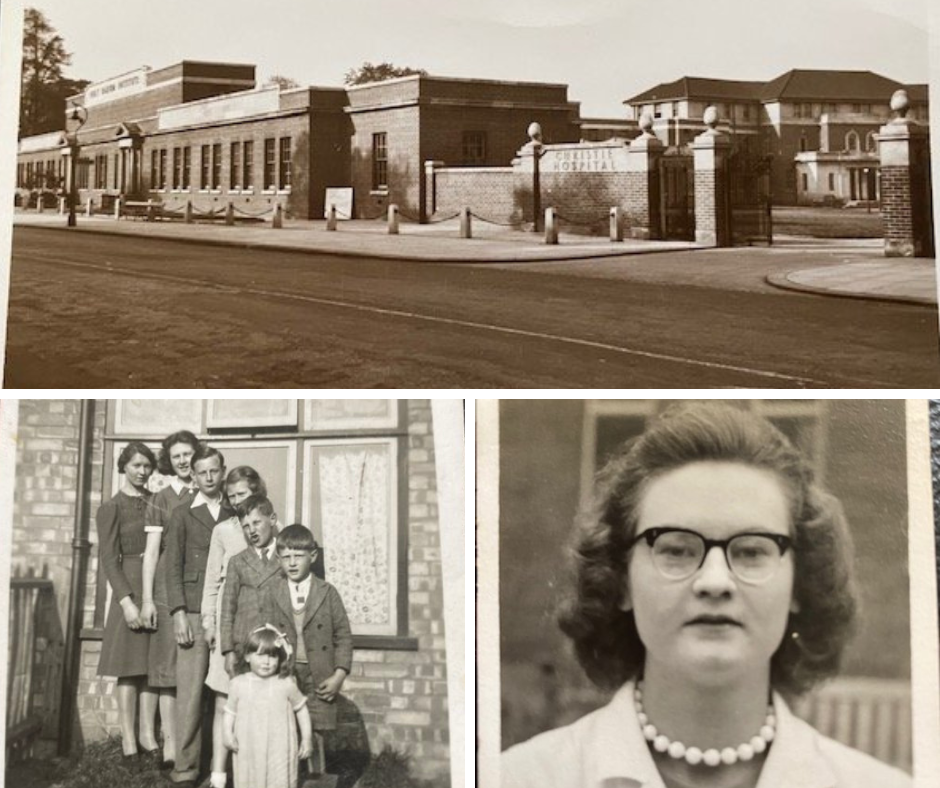Dolores “Dee” Chrystal was born on 23rd of August 1938, in Felixstowe, on the east coast of England. Despite growing up during the war, she remembers her childhood fondly, being the youngest of seven with three brothers and three sisters.
In 1956, she started training to be a Radiotherapy Technician at the Christie Hospital and Holt Radium Institute in Manchester. The directors of the hospital, Sir Ralston and Lady Edith Paterson, were pioneers of Radiotherapy so her two-year training course had the latest research and technology at the time. Dee keeps a copy of the original textbook of radiotherapy techniques written by the Patersons. To this day, radiotherapy is still an effective way of treating breast cancer. In early stages of breast cancer, it can prevent a patient from undergoing a mastectomy, while in more advanced stages, it can reduce the risk of recurrence even after a mastectomy has been performed.
In 1960, Dee migrated to Australia and worked as the Chief Radiographer in the Radiotherapy Department at the Royal Prince Alfred Hospital, Sydney. She stayed with them for 10 years, treating hundreds of breast cancer patients and getting to know some of their treatment journeys. Little did she know that one day, she would be experiencing her own cancer journey.

GETTING THE DIAGNOSIS AND UNDERGOING MASTECTOMY
Three years before retirement, at the age of 62, she went for a mammogram on a mobile detection van on its way to Woy Woy. They detected a nodule in her right breast and was then referred to the Royal North Shore Hospital for further examination. When it was discovered to be malignant, her surgeon Dr Adrian Cohen recommended that she either get a lumpectomy and a course of radiotherapy or a radical mastectomy. Having treated numerous breast cancer patients herself in the past, Dee felt she was mentally prepared for surgery and treatment and decided that mastectomy would be the best course to take.
"The diagnosis came as a surprise as I had not been aware of any lumps, but I am very philosophical and just wanted to get on with the recommended treatment. Having worked with hundreds of cancer patients, I wasn’t as frightened of the word as many people are."

However, Dee described the next three years as “the worst time in my life”. When she was a radiotherapy technician, they would sometimes refer to one-breast patients as “lopsided ladies”, and it was only then that she realised how uncomfortable this experience was first-hand. She sought the advice of a plastic surgeon, but a breast reconstruction was too much of an ordeal to contemplate. And so, she went back to Dr Adrian Cohen, who performed her initial mastectomy, and asked whether she could have a “deconstruction” - meaning another mastectomy on her remaining breast. When Dr Cohen gave her the all clear, she had the operation done.
Dee remembers, “When I awoke from the anaesthetic, I immediately knew I had done the right thing as I felt normal and balanced even though I was flat-chested.”
Dee was referred to a company called You Really are Beautiful, which supplied her with pocket bras and prostheses.
"The best thing about artificial breasts is that you can decide what size you want to be! Since then, I have been quite comfortable. Of course, cancer is always at the back of your mind and a secondary or recurrence always rears its head when there is an unexplained stab of pain, but my lymph glands were clear and so far I have no further problems."
MORE THAN FIVE YEARS CANCER-FREE AND LIVING AN ACTIVE LIFE
Dee considers herself as one of the lucky ones. Cancer has touched her life in more ways than one, with her eldest sister having died of cervical cancer, and another sister having gone through both uterine cancer and bowel cancer. But she marvels at how cancer research has evolved through the years and knows that this could change other people’s lives for the better.
"I visited the Radiotherapy Centre in Gosford and was amazed at the progress that has been made with the advance of computers and technology. Very different to my early days of drawing bodies on paper to take measurements and working out doses on a slide rule!”
This year, Dee turns 84, and she is active and living her life to the fullest. Cure Cancer is one of the charities she supports, and she keeps herself busy by volunteering as Treasurer at the Peninsula School for Seniors at Woy Woy.

Dee Chrystal celebrating her 80th birthday.
OCTOBER IS BREAST CANCER AWARENESS MONTH
As many of you would sadly be aware, it wasn’t too long ago that a mastectomy was the solution for all kinds of breast cancer. Yet today, there are now several other options other than chemotherapy and radical surgery for treating breast cancer.
Despite this progress, there is much more to be done. Breast cancer remains the most prevalent cancer in the world, with 7.8 million diagnosed in the past five years and causing over 685,000 deaths globally.
If you have the capacity, please consider supporting breast cancer research, and funding pioneering researchers who embark on ground-breaking projects to improve patient outcomes and treatments. Together, we can all make a difference.







